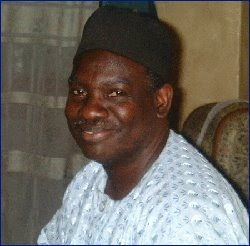 As I prepare to serve Christ in East Africa, my research can turn up some interesting resources. Recently I came across an issue of the Evangelical Review of Theology (ERT), published by the World Evangelical Alliance, that has tremendously relevance to our ministry. The theme of its April 2007 edition is “Revival and the Global Context.” Consequently, over the next few weeks I plan to interact with several of these essays.
As I prepare to serve Christ in East Africa, my research can turn up some interesting resources. Recently I came across an issue of the Evangelical Review of Theology (ERT), published by the World Evangelical Alliance, that has tremendously relevance to our ministry. The theme of its April 2007 edition is “Revival and the Global Context.” Consequently, over the next few weeks I plan to interact with several of these essays. One especially important article is “African Christianity in Global Religious and Cultural Conflict” by Yusufu Turaki, a noted evangelical theologian from Nigeria. Turaki seeks to address several of the most pressing global issues and challenges facing African Christianity today. These include the escalating conflict between the West (i.e., North America and Europe) and militant Islam; the growing rift between Western Christianity and African Christianity; the historical ties between Islam and African Christianity; and the tension between traditional religions/cultures and African Christianity.
One especially important article is “African Christianity in Global Religious and Cultural Conflict” by Yusufu Turaki, a noted evangelical theologian from Nigeria. Turaki seeks to address several of the most pressing global issues and challenges facing African Christianity today. These include the escalating conflict between the West (i.e., North America and Europe) and militant Islam; the growing rift between Western Christianity and African Christianity; the historical ties between Islam and African Christianity; and the tension between traditional religions/cultures and African Christianity.While Turaki’s entire article was informative, two elements stood out.
First, his discussion of Islam and Christianity in Africa was especially enlightening. From the different levels with which Islam has historically confronted African Christianity to the need for correcting the Muslim misperception of Christianity as merely an imported Western religion, Turaki succinctly summarizes the longstanding tensions between these two religions throughout the continent.
Second, he reminds us of the ongoing danger of cults and false teaching in Africa:
Besides western neo-paganism, there are new forms of Christianity coming out of the West that have serious theological implications for Christianity world-wide. There are Christian cults and syncretism that are coming out from the West into Africa.Does this sound familiar? Yes, I’ve often emphasized this point, but it’s helpful when a well-known African theologian underscores the same challenges. Turaki goes on to say:
. . . Africa also has its own home-grown revived neo-paganism, religious cults and syncretism. These contemporary religious movements are being boosted by (1) pagan revival in the West; and (2) the religious vibrancy and fervour of American Prosperity Pentecostalism.And in contrast to the relativistic attitudes one often finds in the wider missions community, Turaki concludes this section with this ringing call to action:
. . . [N]ot every form of Christian expression is authentic, biblical and culturally relevant in an African setting. Not every theological experiment, teaching and model is acceptable and relevant. The believing Christian community has the duty of ascertaining what is acceptable or not. Not every cultural understanding, interpretation and expression is valid, as this has to be authenticated by the believing Christian community. In its own self and spiritual understanding of the Scriptures and apostolic Christianity, the believing Christian community can set guidelines as to what forms of Christian expressions are valid or not. Only sound biblical hermeneutics or exegesis and theological methods can help guard against possible errors, heresies and syncretism which may tend towards the emergence of new cults and neo-paganism.What does Turaki see as the solution? Churches and believers who practice biblical discernment. (And all I can say is a hearty “Amen!”)
I praise God for my African brothers and sisters in Christ, for He is truly at work throughout the continent. At the same time, Turaki illustrates us the need for further theological reflection and refinement in light of difficult global issues.
Let us press on, glorifying our Savior as we equip Christians in Africa to face these challenges!



